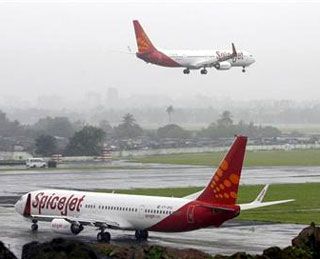Any government aid to the airline will ultimately hurt the economy
 SpiceJet runs out of cash, and has cancelled hundreds of flights. It reportedly owes something like Rs 3,000 crore (Rs 30 billion) — to oil companies, airports, the travel industry et al. To all appearances, it is going the Kingfisher way. Sensibly, the authorities had stopped the airline from selling tickets for more than a month into the future, in case it went belly up before that.
SpiceJet runs out of cash, and has cancelled hundreds of flights. It reportedly owes something like Rs 3,000 crore (Rs 30 billion) — to oil companies, airports, the travel industry et al. To all appearances, it is going the Kingfisher way. Sensibly, the authorities had stopped the airline from selling tickets for more than a month into the future, in case it went belly up before that.
But when the airline management runs to the government it replays the Kingfisher act. In that earlier case, banks continued to give money and provide repayment relief to a bankrupt airline. This time, it is oil companies that have been asked by the government to give the airline further credit on aviation fuel. If they do, will they get paid? Not likely. So what does the government think it is achieving?
The difference between a market economy and a state-dominated one that favours oligarchs is easy to tell. In the former, an airline that goes bankrupt would simply be allowed to die, or get taken over by new owners. New ones will be born and life will go on.
But in a crony capitalist system, businesses that run into trouble run to the government, which instead of excising dead flesh decides to spread the poison. Banks take the hit, extend repayment and restructure loans for company promoters, who get a virtually free ride. Private power plants that took the wrong bet on fuel are sought to be salvaged by penalising Coal India (which is asked to provide cheaper coal, and take the hit in revenue and profits).
In a healthy system, it is those who put risk capital (that is, equity) into a project who lose first and most, if their calculations go wrong. Halliburton has already taken a write-down of $800 million as oil prices have fallen. BP took a $770-million write-down on its investment in Reliance Industries’ gas fields when it realised that it would not get the gas price it had hoped for.
Rupert Murdoch wrote off half the $5.7 billion he paid for Dow Jones, within two years of making the acquisition. And banks and financial players who were holding junk debt in the wake of the 2008 financial crisis either went under, got bought over, or got rid of the debt by selling it at up to 90 per cent discount.
It sounds like drastic medicine, but the virtue is that balance sheets get cleaned up and everyone moves on. That is why the United States economy has recovered fairly quickly from an almighty financial mess and is now powering ahead. That history may now repeat itself, as many bets on shale oil come unstuck. Up to $1 trillion of investment in the business is said to be at risk if oil prices fall further.
You can be sure that if it comes to that, investors will write off their money. The pay-off? A shale oil industry that is healthy because it enjoys a write-down on the capital that needs to be serviced. In the end, oil production may not suffer!
Compare that with the picture in India, where those who have invested risk capital don’t want to take the hit. Invariably, the system obliges by trying to bail them out — and thereby shortchanges itself. The result is today’s economy, which sputters but refuses to come to life. Projects involving investment of a staggering Rs 18 lakh crore (or 14 per cent of gross domestic product) are stuck.
Companies are stuck with mountains of bad debt, and banks are stuck with mountains of bad loans. The first lot has no more funds to invest and the second lot needs recapitalisation. The outcome: no fresh investment, and no economic recovery. Moral of the story: take the hit and bear the pain, but move on.












 © 2025
© 2025